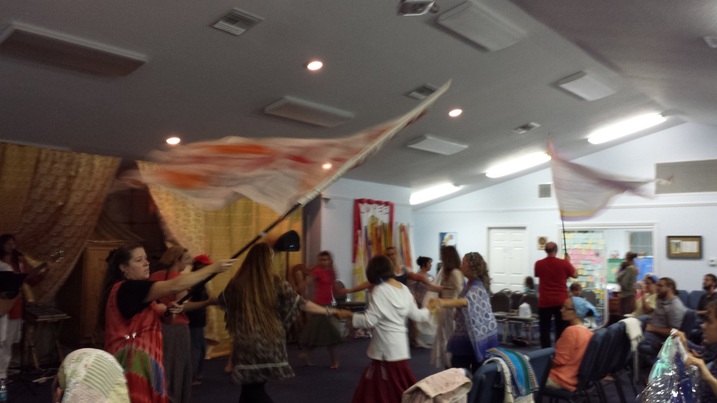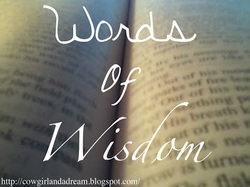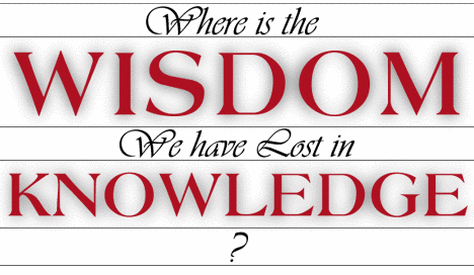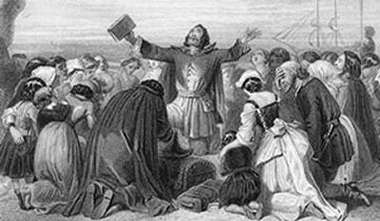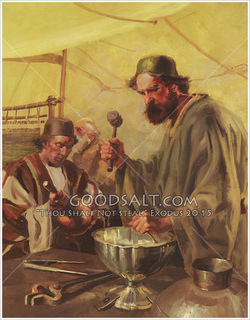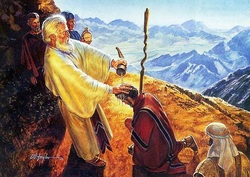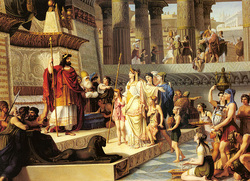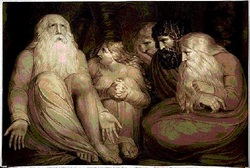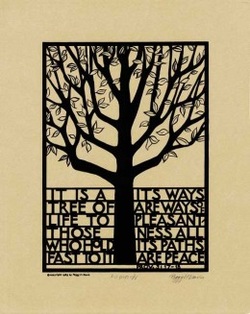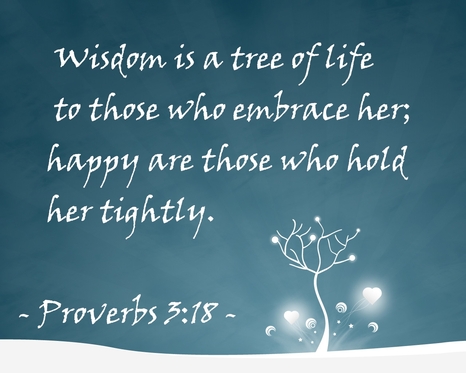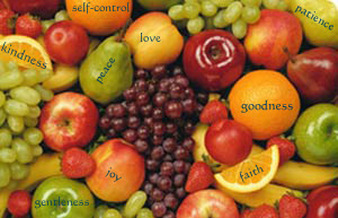
Proverbs 11:30 The fruit of the righteous [is] a tree of life; and he that winneth souls [is] wise.
Good deeds which are the Fruit of Righteousness.The results of the Fruits from the Spirit of Yah in our lives become a tree of life to us. Lets review some scriptures. In the book of Philippians we are to be filled with the fruits of righteousness...
Philippians 1:9-11 9 And this I pray, that your love may abound yet more and more in knowledge and [in] all judgment; 10 That ye may approve things that are excellent; that ye may be sincere and without offence till the day of Christ; 11 Being filled with the fruits of righteousness, which are by Yeshua our Messiah, unto the glory and praise of God.
In the book of Galatians it lists the Fruit of the Spirit.....
Gal 5:22-26 22: But the fruit of the Spirit is love, joy, peace, longsuffering, gentleness, goodness, faith, 23 Meekness, Temperance: against such there is no law. 24 And they that are Christ's have crucified the flesh with the affections and lusts. 25 If we live in the Spirit, let us also walk in the Spirit. 26 Let us not be desirous of vain glory, provoking one another, envying one another.
Good deeds which are the Fruit of Righteousness.The results of the Fruits from the Spirit of Yah in our lives become a tree of life to us. Lets review some scriptures. In the book of Philippians we are to be filled with the fruits of righteousness...
Philippians 1:9-11 9 And this I pray, that your love may abound yet more and more in knowledge and [in] all judgment; 10 That ye may approve things that are excellent; that ye may be sincere and without offence till the day of Christ; 11 Being filled with the fruits of righteousness, which are by Yeshua our Messiah, unto the glory and praise of God.
In the book of Galatians it lists the Fruit of the Spirit.....
Gal 5:22-26 22: But the fruit of the Spirit is love, joy, peace, longsuffering, gentleness, goodness, faith, 23 Meekness, Temperance: against such there is no law. 24 And they that are Christ's have crucified the flesh with the affections and lusts. 25 If we live in the Spirit, let us also walk in the Spirit. 26 Let us not be desirous of vain glory, provoking one another, envying one another.

In the book of Matthew Yeshua tells us how he feels about helping others..
Matthew 25: 31- 46 31When the Son of man shall come in his glory, and all the holy angels with him, then shall he sit upon the throne of his glory: 32 And before him shall be gathered all nations: and he shall separate them one from another, as a shepherd divideth [his] sheep from the goats: 33 And he shall set the sheep on his right hand, but the goats on the left. 34 Then shall the King say unto them on his right hand, Come, ye blessed of my Father, inherit the kingdom prepared for you from the foundation of the world: 35 For I was an hungred, and ye gave me meat: I was thirsty, and ye gave me drink: I was a stranger, and ye took me in: 36 Naked, and ye clothed me: I was sick, and ye visited me: I was in prison, and ye came unto me. 37 Then shall the righteous answer him, saying, Lord, when saw we thee an hungred, and fed [thee]? or thirsty, and gave [thee] drink? 38 When saw we thee a stranger, and took [thee] in? or naked, and clothed [thee]? 39 Or when saw we thee sick, or in prison, and came unto thee? 40 And the King shall answer and say unto them, Verily I say unto you, Inasmuch as ye have done [it] unto one of the least of these my brethren, ye have done [it] unto me. 41 Then shall he say also unto them on the left hand, Depart from me, ye cursed, into everlasting fire, prepared for the devil and his angels: 42 For I was an hungred, and ye gave me no meat: I was thirsty, and ye gave me no drink: 43 I was a stranger, and ye took me not in: naked, and ye clothed me not: sick, and in prison, and ye visited me not. 44 Then shall they also answer him, saying, Lord, when saw we thee an hungred, or athirst, or a stranger, or naked, or sick, or in prison, and did not minister unto thee? 45 Then shall he answer them, saying, Verily I say unto you, Inasmuch as ye did [it] not to one of the least of these, ye did [it] not to me. 46 And these shall go away into everlasting punishment: but the righteous into life eternal.
Matthew 25: 31- 46 31When the Son of man shall come in his glory, and all the holy angels with him, then shall he sit upon the throne of his glory: 32 And before him shall be gathered all nations: and he shall separate them one from another, as a shepherd divideth [his] sheep from the goats: 33 And he shall set the sheep on his right hand, but the goats on the left. 34 Then shall the King say unto them on his right hand, Come, ye blessed of my Father, inherit the kingdom prepared for you from the foundation of the world: 35 For I was an hungred, and ye gave me meat: I was thirsty, and ye gave me drink: I was a stranger, and ye took me in: 36 Naked, and ye clothed me: I was sick, and ye visited me: I was in prison, and ye came unto me. 37 Then shall the righteous answer him, saying, Lord, when saw we thee an hungred, and fed [thee]? or thirsty, and gave [thee] drink? 38 When saw we thee a stranger, and took [thee] in? or naked, and clothed [thee]? 39 Or when saw we thee sick, or in prison, and came unto thee? 40 And the King shall answer and say unto them, Verily I say unto you, Inasmuch as ye have done [it] unto one of the least of these my brethren, ye have done [it] unto me. 41 Then shall he say also unto them on the left hand, Depart from me, ye cursed, into everlasting fire, prepared for the devil and his angels: 42 For I was an hungred, and ye gave me no meat: I was thirsty, and ye gave me no drink: 43 I was a stranger, and ye took me not in: naked, and ye clothed me not: sick, and in prison, and ye visited me not. 44 Then shall they also answer him, saying, Lord, when saw we thee an hungred, or athirst, or a stranger, or naked, or sick, or in prison, and did not minister unto thee? 45 Then shall he answer them, saying, Verily I say unto you, Inasmuch as ye did [it] not to one of the least of these, ye did [it] not to me. 46 And these shall go away into everlasting punishment: but the righteous into life eternal.
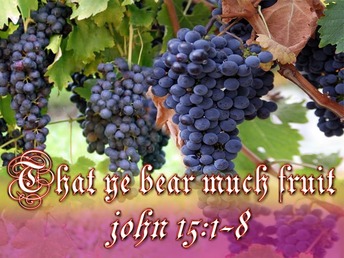
In the Talmud I liked this ...
"the deeds of the righteous yield fruit … the deeds of the wicked do not produce fruit, for if they produced fruit they would destroy the world" (Gen. R. 33:1); "If a good deed comes your way, do it immediately" (Mekh. Pisḥa 9). http://www.jewishvirtuallibrary.org/jsource/judaica/ejud_0002_0011_0_10369.html
In the book of James it gives us this clue of how the fruit of righteousness is sown.
James 3:13-18 13 Who is a wise man and endued with knowledge among you? let him shew out of a good conversation his works with meekness of wisdom.14 But if ye have bitter envying and strife in your hearts, glory not, and lie not against the truth. 15 This wisdom descendeth not from above, but is earthly, sensual, devilish.16 For where envying and strife is, there is confusion and every evil work.17 But the wisdom that is from above is first pure, then peaceable, gentle, and easy to be intreated, full of mercy and good fruits, without partiality, and without hypocrisy. 18 And the fruit of righteousness is sown in peace of them that make peace.
"the deeds of the righteous yield fruit … the deeds of the wicked do not produce fruit, for if they produced fruit they would destroy the world" (Gen. R. 33:1); "If a good deed comes your way, do it immediately" (Mekh. Pisḥa 9). http://www.jewishvirtuallibrary.org/jsource/judaica/ejud_0002_0011_0_10369.html
In the book of James it gives us this clue of how the fruit of righteousness is sown.
James 3:13-18 13 Who is a wise man and endued with knowledge among you? let him shew out of a good conversation his works with meekness of wisdom.14 But if ye have bitter envying and strife in your hearts, glory not, and lie not against the truth. 15 This wisdom descendeth not from above, but is earthly, sensual, devilish.16 For where envying and strife is, there is confusion and every evil work.17 But the wisdom that is from above is first pure, then peaceable, gentle, and easy to be intreated, full of mercy and good fruits, without partiality, and without hypocrisy. 18 And the fruit of righteousness is sown in peace of them that make peace.

Here are some interesting articles on some studies of proving that the fruit of the righteous will be a tree of life.
The Healing Power of Doing Good Paperback ›Allan Luks(Author),Peggy Payne(Author)
Conventional wisdom has always held that when we help others, some of the good we do flows back to us. That satisfaction has always been thought to be largely emotionalfeeling good when you do good. Now important, widely discussed research shows that helping others regularly produces significant health benefits as wellin fact, it has effects similar to those many of us experience when we exercise
Why Good Things Happen to Good People: How to Live a Longer, Healthier, Happier Life by the Simple Act of Giving Paperback by Stephen Post(Author),Jill Neimark(Author),Otis Moss Jr.(Foreword)& 1 more
Dr. Stephen Post has been making headlines by funding studies at the nation’s top universities to prove once and for all the life-enhancing benefits of caring, kindness, and compassion. The exciting new research shows that when we give of ourselves, especially if we start young, everything from life-satisfaction to self-realization and physical health is significantly affected. Mortality is delayed. Depression is reduced. Well-being and good fortune are increased. In their life-changing new book, Why Good Things Happen to Good People, Dr. Post and journalist Jill Neimark weave the growing new science of love and giving with profoundly moving real-life stories to show exactly how giving unlocks the doors to health, happiness, and a longer life.
The astounding new research includes a fifty-year study showing that people who are giving during their high school years have better physical and mental health throughout their lives. Other studies show that older people who give live longer than those who don’t. Helping others has been shown to bring health benefits to those with chronic illness, including HIV, multiple sclerosis, and heart problems. And studies show that people of all ages who help others on a regular basis, even in small ways, feel happiest.
Why Good Things Happen to Good People offers ten ways to give of yourself, in four areas of life, all proven by science to improve your health and even add to your life expectancy. (And not one requires you to write a check.) The one-of-a-kind “Love and Longevity Scale” scores you on all ten ways, from volunteering to listening, loyalty to forgiveness, celebration to standing up for what you believe in. Using the lessons and guidelines in each chapter, you can create a personalized plan for a more generous life, finding the style of giving that suits you best.
The astonishing connection between generosity and health is so convincing that it will inspire readers to change their lives in ways big and small. Get started today. A longer, healthier, happier life awaits you.
The Healing Power of Doing Good Paperback ›Allan Luks(Author),Peggy Payne(Author)
Conventional wisdom has always held that when we help others, some of the good we do flows back to us. That satisfaction has always been thought to be largely emotionalfeeling good when you do good. Now important, widely discussed research shows that helping others regularly produces significant health benefits as wellin fact, it has effects similar to those many of us experience when we exercise
Why Good Things Happen to Good People: How to Live a Longer, Healthier, Happier Life by the Simple Act of Giving Paperback by Stephen Post(Author),Jill Neimark(Author),Otis Moss Jr.(Foreword)& 1 more
Dr. Stephen Post has been making headlines by funding studies at the nation’s top universities to prove once and for all the life-enhancing benefits of caring, kindness, and compassion. The exciting new research shows that when we give of ourselves, especially if we start young, everything from life-satisfaction to self-realization and physical health is significantly affected. Mortality is delayed. Depression is reduced. Well-being and good fortune are increased. In their life-changing new book, Why Good Things Happen to Good People, Dr. Post and journalist Jill Neimark weave the growing new science of love and giving with profoundly moving real-life stories to show exactly how giving unlocks the doors to health, happiness, and a longer life.
The astounding new research includes a fifty-year study showing that people who are giving during their high school years have better physical and mental health throughout their lives. Other studies show that older people who give live longer than those who don’t. Helping others has been shown to bring health benefits to those with chronic illness, including HIV, multiple sclerosis, and heart problems. And studies show that people of all ages who help others on a regular basis, even in small ways, feel happiest.
Why Good Things Happen to Good People offers ten ways to give of yourself, in four areas of life, all proven by science to improve your health and even add to your life expectancy. (And not one requires you to write a check.) The one-of-a-kind “Love and Longevity Scale” scores you on all ten ways, from volunteering to listening, loyalty to forgiveness, celebration to standing up for what you believe in. Using the lessons and guidelines in each chapter, you can create a personalized plan for a more generous life, finding the style of giving that suits you best.
The astonishing connection between generosity and health is so convincing that it will inspire readers to change their lives in ways big and small. Get started today. A longer, healthier, happier life awaits you.
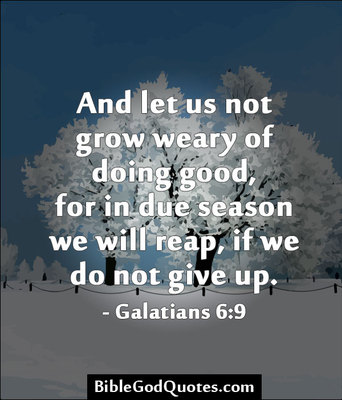
This is a article called 'The Science of Good Deeds' from the Mayo clinic website click on the link below to read the whole article if you would like. This article shows that doing good deeds extends our lives.
The 'helper's high' could help you live a longer, healthier life.
This is the focus of 50 scientific studies funded through The Institute for Research on Unlimited Love, headed by Stephen G. Post, PhD, a professor of bioethics at Case Western Reserve University School of Medicine. It is a comprehensive investigation of altruism, aka benevolence, compassion, generosity, and kindness.
http://www.webmd.com/balance/features/science-good-deeds
"Studies of telomeres -- the end-caps of our genes -- show that long-term stress can shorten those end-caps, and shortened end-caps are linked with early death," he tells WebMD. "These studies indicate that we're dealing with something that's extremely powerful. Ultimately, the process of cultivating a positive emotional state through pro-social behaviors -- being generous -- may lengthen your life."
"Surprisingly, they found that numbers of children, education, class, and work status did not affect longevity," writes Post. After following these women for 30 years, researchers found that 52% of those who did not volunteer had experienced a major illness -- compared with 36% who did volunteer.
Two large studies found that older adults who volunteered reaped benefits in their health and well-being. Those who volunteered were living longer than nonvolunteers. Another large study found a 44% reduction in early death among those who volunteered a lot -- a greater effect than exercising four times a week, Post reports.
"All the great spiritual traditions and the field of positive psychology are emphatic on this point -- that the best way to get rid of bitterness, anger, rage, jealousy is to do unto others in a positive way," Post tells WebMD. "It's as though you somehow have to cast out negative emotions that are clearly associated with stress -- cast them out with the help of positive emotions."
So our second tree of life is doing good deeds and showing the fruit of the spirit in our life. When we do this we are fulfilling our Fathers will and he in return rewards us. Amazing is the feeling I get when I read this. Yah has been telling us this all along. D'vorah.
The 'helper's high' could help you live a longer, healthier life.
This is the focus of 50 scientific studies funded through The Institute for Research on Unlimited Love, headed by Stephen G. Post, PhD, a professor of bioethics at Case Western Reserve University School of Medicine. It is a comprehensive investigation of altruism, aka benevolence, compassion, generosity, and kindness.
http://www.webmd.com/balance/features/science-good-deeds
"Studies of telomeres -- the end-caps of our genes -- show that long-term stress can shorten those end-caps, and shortened end-caps are linked with early death," he tells WebMD. "These studies indicate that we're dealing with something that's extremely powerful. Ultimately, the process of cultivating a positive emotional state through pro-social behaviors -- being generous -- may lengthen your life."
"Surprisingly, they found that numbers of children, education, class, and work status did not affect longevity," writes Post. After following these women for 30 years, researchers found that 52% of those who did not volunteer had experienced a major illness -- compared with 36% who did volunteer.
Two large studies found that older adults who volunteered reaped benefits in their health and well-being. Those who volunteered were living longer than nonvolunteers. Another large study found a 44% reduction in early death among those who volunteered a lot -- a greater effect than exercising four times a week, Post reports.
"All the great spiritual traditions and the field of positive psychology are emphatic on this point -- that the best way to get rid of bitterness, anger, rage, jealousy is to do unto others in a positive way," Post tells WebMD. "It's as though you somehow have to cast out negative emotions that are clearly associated with stress -- cast them out with the help of positive emotions."
So our second tree of life is doing good deeds and showing the fruit of the spirit in our life. When we do this we are fulfilling our Fathers will and he in return rewards us. Amazing is the feeling I get when I read this. Yah has been telling us this all along. D'vorah.
